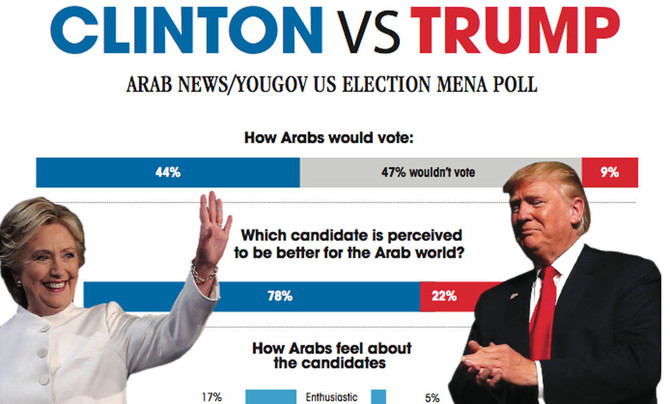WASHINGTON: Following this week’s Arab News/YouGov poll on how the average citizen in the Middle East and North Africa (MENA) region views the US presidential race, leading experts weigh in on what the numbers mean and say about American politics and policy.
The Arab News/YouGov US election MENA poll of 3,017 people, published on Thursday, found that most believe Hillary Clinton to be the best choice for US president — but are aligned with Donald Trump on some of his most controversial stances.
Clinton emerged as the most popular of the two candidates, with 44 percent of Arab respondents saying they would vote for her, and 78 percent saying she would be the best for the Arab world. But a surprising 47 percent said they would snub both candidates — suggesting widespread dissatisfaction with the election frontrunners.
Arab News discussed the results of the poll with key scholars of US politics and the Middle East. Here is their take:
Arabs more anti-Trump than pro-Clinton
Randa Slim is a Director of the Track two Dialogue initiative, at the Middle East Institute in Washington, DC. She tweets at @rmslim.
I would argue that the support for Hillary Clinton is more driven by the anti-Trump attitude than by any thorough knowledge of where the former secretary of state stands on the issues. In that context, Trump’s anti-Muslim stance is the main driver of the negative attitudes toward him. What I found to be the most intriguing part of the poll is this 73 percent support level for Clinton on US-Israel ties. My assumption is that this reflects the respondents’ incorrect belief that Clinton will continue Obama’s approach on this issue — Obama’s being tough on Israel pleased Arabs. The focus on climate change is interesting and a welcome finding about the preoccupation of the Arab youth (given the) sample is mostly young, with 50 percent in the 20-29 age category.
Immigration comments have sunk in
Malcolm Nance is a career counterterrorism and intelligence officer. Author of five books on the Middle East. He tweets at @MalcolmNance.
The most fascinating aspect I found out about the poll was the fact that only 7 percent of respondents in the Middle East were above the age of 50. This (age group) is perhaps the most savvy and well educated group of respondents when it comes to the history of US involvement in the Middle East. This may also explain the dynamics of why 48 percent of the respondents never follow US elections or politics. In my 35 years in the Middle East I find that almost unheard of. But it is believable for much younger people. That support for Hillary Clinton is at 44 percent is a reflection of the status quo and that they don’t believe US policy will change dramatically. The 9 percent support for Donald Trump, and 71 percent dissatisfied or are upset about his candidacy ... means that his comments on immigration have sunk in, with extremely high negatives. I think that’s almost universal. Also fascinating is that the region perceived Russia as America’s biggest problem despite the fact we’ve been fighting wars there for over 15 years. It’s interesting that they believe this is our chief concern. Fascinating in the sense that they appear to be reflecting opinions based on priorities seen in repeated viewings of the Western TV news media. Putin’s propaganda war and ratcheting up of operations against the West as well as the DNC hackers are accurately reflected in their media consumption.
Reagan Republicanism looms large
Noah Rothman is an assistant online editor at Commentary Magazine, a 71-year-old journal based in New York. He tweets at @NoahCRothman.
My biggest takeaway from the Arab News/YouGov poll is that the Arab poll respondents see Russian expansionism and an intrusive federal government as the biggest threats to the American public. They are, therefore, Reagan Republicans. Donald Trump has turned away from the kind of limited government conservatism that previously informed the Republican electorate, and his likely defeat on Nov. 8 has the potential to rehabilitate Reaganism. If so, this polls suggests that the Arab world would welcome a return to a status quo ante Sept. 11th Republicanism, particularly in regard to the managing of conflicts like the global war on terrorism and the Syrian civil war.
The US is still a key player
Eric Trager, Esther K. Wagner Fellow at The Washington Institute for Near East Policy, and Author of “Arab Fall: How the Muslim Brotherhood Won and Lost Egypt in 891 Days.” He tweets at @EricTrager18.
The significantly stronger support for Hillary Clinton in the poll suggests that Donald Trump’s comments on Muslims have cost him support among mostly Muslim Arab publics. But the fact that the plurality are indifferent suggests that Arabs are not attached to a particular candidate, but instead are simply watching the elections because they believe that the results will have an impact on the region no matter who wins. While many in Washington doubt whether the US can exert significant influence in the Middle East given the experience of the previous 15 years, this poll suggests that many Arabs still believe that the US remains a pivotal player, and that the outcome of the election therefore has significant implications.
Arab News poll shows Middle East citizens hungry for US policy change
Arab News poll shows Middle East citizens hungry for US policy change










